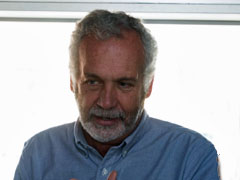The Catalan geographer upholds the city as a collective project and describes how it can help to improve people’s quality of life. He afirms that public space should be considered at the metropolitan level and highlights the importance of recovered spaces with collective connotations.
Shared Spaces recorded this conversation with Oriol Nel·lo in November 2012 when he visited the Centre of Contemporary Culture of Barcelona (CCCB) as a speaker at the event in which Francesco Indovina spoke about “From Analysis of the Territory to Government of the City”. Nel·lo upholds the city as an antidote to segregation by means of “constructing spaces which will certainly not bring about radical changes in social conditions but they will help to overcome some effects of the socioeconomic system”.
By this he means “improving people’s objective conditions of life in the short term and thereby being able to favour more thoroughgoing changes which would eventually affect the structural bases”. The instrument for achieving this should be a public domain that goes beyond streets and squares, and it should be equipped with facilities, services and other amenities which confer on the city a collective and integrating character, instead of the present privatising thrust.
Nel·lo also speaks of the housing areas in cities which are deprived of the most basic services: pavements, water and sewers. In order to provide them, he says, the planning must be done on the metropolitan scale. “We need to escape from the idea that only the town square can be public space”. This means taking into account housing settlements and, indeed, the metropolitan area as a whole, instead of merely focusing on the public spaces of municipal nuclei.
Finally, Nel·lo lists several of his favourite public spaces, all of which share one feature: they are recovered spaces with an underlying collective meaning, ranging from a local residents’ campaign through to plans for projects like Catalan neighbourhood legislation.



